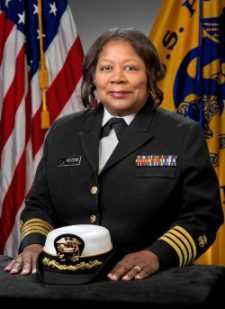Previous Health Equity Matters Newsletter
Announcements
OMHHE Staff Changes

Sonja S. Hutchins, MD, MPH, DrPH, FACPM (CAPT, USPHS), will retire on June 1, 2017, after 31 years of outstanding federal service with CDC and 30 years as an active duty medical officer in the US Public Health Service (PHS). Sonja joined CDC as an EIS officer in 1986 in the then- named Division of Immunization, now the National Center for Immunization and Respiratory Diseases (NCIRD). She is the first African American female to enter the EIS program and complete a 30-year career as a Commissioned Corps Officer in the PHS at CDC. She follows the path of Walter W. Williams, MD, MPH, medical officer, who is the first African American to hold the distinction after African Americans began joining the EIS program in 1965.
Sonja joined the EIS program at the beginning of a measles resurgence in the United States. She first played a key role in the description, prevention, and control of the new measles epidemiology: disease primarily among unvaccinated preschool children in large inner cities. Next, she provided key science for the second dose of measles vaccine among school children based on outbreak investigations and surveillance. Sonja worked tirelessly—individually and as a team leader—to prevent and control measles and attain high age-appropriate child vaccination under the Infant and Child Immunization Initiatives. These initiatives were critical to the ultimate elimination of endemic transmission of measles and the achievement of record high age-appropriate child vaccination in the United States. She played a key role in these initiatives by leading and conducting operational and health services research, as well as providing technical assistance to state and local public health agencies on their Immunization Action Plans. Because of her knowledge and experiences, she has served as a consultant to the Pan American Health Organization (PAHO) and the World Health Organization (WHO) on measles elimination, child vaccination, and primary care.
During 20 years in the immunization program, she worked particularly closely with state, tribal, and local public health agencies, as well as with strategic national organizations and community partners, to improve child vaccination among low-income and minority populations. She has published extensively on all of her research on measles, pertussis and diphtheria prevention, control, or elimination, in addition to access to and delivery of high-quality vaccination of young children. She is quite proud of her publications that describe the first national success story in reducing or eliminating heath disparities and her key roles in conducting or directing universal and targeted interventions (or a dual strategy) designed to reach all young children with vaccines.
After elimination of endemic measles, Sonja decided to complete a doctor of public health in epidemiology to advance knowledge about the value of a small sample size in evaluating public health interventions. She wanted to identify situations in which small samples provided as reliable results as large sample-sized studies. She recently published such a situation in the Journal of Comparative Effectiveness Research.
During the early 2000s, she applied her knowledge and skills relating to vaccine-preventable diseases to public health preparedness and response of vulnerable populations to disasters. In 2007, she was recruited to the CDC Office of Minority Health to lead a cross-agency workgroup that convened stakeholders for and published articles on 13 categories of vulnerable populations before the H1N1 influenza pandemic. Since then, Sonja has held several positions in the Office of Minority Health and Health Equity (OMHHE) such as acting associate director for science, associate director for medical science and now as the senior medical advisor and lead for the OMHHE public health preparedness and response activities. Also in these roles, she served several years as either the vice chair or the chair of the Science Board of the American Public Health Association (APHA) and as a member of the editorial board of its journal, the American Journal of Public Health. (The APHA is a partner of the CDC in reducing health disparities). Sonja has numerous PHS awards from her CDC work, including the Outstanding Service Medal and Foreign Duty Service Awards. She has mentored numerous staff; students in high school, college, graduate schools of public health and medicine; in addition to medical residents in internal and preventive medicine.
Sonja received a bachelor of arts in biology cum laude from Cornell University, a medical degree with honors from Mount Sinai School of Medicine, a Master of Public Health in Immunology and Infectious Diseases from the Johns Hopkins School of Hygiene and Public Health, and a Doctor of Public Health in Epidemiology and Public Health Leadership from the University of North Carolina School of Public Health in Chapel Hill. Her residency training was in internal medicine at Washington Hospital Center and Preventive Medicine at Johns Hopkins. She is board certified in Preventive Medicine and Public Health, and is an adjunct Clinical Associate Professor at Morehouse School of Medicine.
During her retirement, she plans to continue to serve on the faculty of Morehouse School of Medicine, work with her church on health and boy scouting, and serve as a member of her alumni associations.

Diane Dennis-Stephens, MPH, MT (ASCP), retired from CDC December 31, 2016 after 35 years of federal service. Diane began her health career in the U.S. Army as a medical technology specialist from 1973-1976 where she achieved the rank of E-5 (equivalent to a sergeant) upon being honorably discharged from the service.
After leaving the military, she worked in various hospitals included a Veteran’s Hospital as a medical technologist until 1983 when she was hired as an analytical organic chemist by the U.S. Environmental Protection Agency (USEPA). While at the USEPA, Diane got involved in supporting the recruitment and advancement of African American employees. She was elected by her peers to represent and chair the Black Employees Enrichment Association. In addition to her work as an advocate for African American employees, Diane also became very active in the Environmental Justice (EJ) Movement and was her office representative for the Agency’s EJ working committee.
After a 12-year career at the USEPA in Chicago, Diane joined ATSDR’s Division of Health Education and Promotion in 1998. There, she continued working with communities that were negatively impacted by environmental factors through the coordination development and maintenance of ATSDR’s Case Studies in Environmental Medicine.
In December 2003, she became acting associate director for the new NCEH/ATSDR Health Disparities Unit, a position that became permanent in June 2004. From there, she joined the Coordinating Center for Environmental Health and Injury Prevention (CCEHIP) where she served as health equity officer and co-chair of the CDC/ATSDR Minority Initiatives Coordinating Committee (CAMICC) for two years. During her term as the co-chair CAMICC launched a series of lectures aimed at bring attention to or raising awareness of health disparities issues in Public Health across the Agency, entitled “CAMICC’s Health Disparities Lecture Series.” She also served as CCEHIP’s Workforce Diversity representative for the Agency committee and the Workforce Diversity Action Plan Coordinator for the coordinating center. In that capacity she developed and spearheaded a very successful Workforce Diversity Conference entitled “Growing Greater in CCEHIP.”
Diane came to the Office of Women’s Health in January 2010, where she has taken on a number of tasks that support OWH efforts to enhance women and girls’ health. In addition to her role in OWH, she is also a member of the Health Equity Workgroup, the CDC Diversity Council, and formerly the Racism and Health Work Group which is no longer active.
Since 2008, Diane has volunteered each year to go to some of the poorest areas of Africa on medical missions with her church. The purpose of these mission trips is to bring healthcare and treatment to those who have no access to clinics, hospitals or any other type of medical care. She has found these missions’ trips very rewarding and hopes to continue participating as long as the opportunity is available. In addition to her mission work, she also volunteers at the Atlanta Pregnancy Center supporting the center’s board of directors in their efforts to strategically plan and operate their Resource Center which focuses on helping women and their families deal with crisis pregnancy issues.
Diane received her undergraduate degree in chemistry from the University of Illinois at Chicago, and her master’s degree in public health from the University of Illinois’ School of Public Health; her major field of study was occupational and environmental health and safety with a minor in epidemiology. She retains an American Society of Clinical Pathologists (ASCP) medical technologist license.
After retirement, Diane plans to travel all over the world with her husband. Cuba is their first destination next year. They want to see and enjoy the culture before it becomes too commercialized! Diane will also continue to be involved with community service projects with her church and serve as a board member with a girl’s mentoring program, GLOSS.
Funding Opportunities
National Lupus Outreach and Clinical Trial Education Program (Lupus Program)
Announcement Number: CPI-MP-17-002 Estimated Funding Level: $$2 million total for both Priority A and Priority B ($1 million for each Priority) Application Deadline: July 1, 2017
HHS/National Institutes of Health (NIH): Addressing Health Disparities through Effective Interventions among Immigrant Populations (R01) Grant.
Application Deadline: June 5, 2017.
HHS/Health Resources and Services Administration (HRSA): Health Professional Support Program for Children with Congenital Zika Virus Infection Grant.
Application Deadline: June 12, 2017.
HHS/HRSA: Behavioral Health Workforce Education and Training Program Grant.
Application Deadline: June 12, 2017.
HHS/Centers for Disease Control and Prevention (CDC): Scaling the National Diabetes Prevention Program in Underserved Areas – Cooperative Agreement.
Application Deadline: June 12, 2017.
Conferences/Meetings
CSTE Annual Conference– June 4-8, 2017
The Council of State and Territorial Epidemiologists (CSTE) Annual Conference will take place in Boise, Idaho.
Rural Women’s Health Symposium “A Holistic Approach to Health” – June 28, 2017
This conference will provide an opportunity to network, and learn and enhance professional development as part of our work promoting policies, services, and practices that improve the health of Arizona women.
National Council of La Raza Líderes Summit. July 8-11, 2017
Líderes provides leadership experience to Hispanic/Latino youth ages 14-23, focusing on areas such as professional development, civic engagement, and networking in Phoenix, AZ.
State of Mental Health Disparities in the African American Community – August 18-19, 2017
The State of Mental Health Disparities in the African American Community: The Case for Correcting Cultural Trauma is a community engagement activity designed to raise awareness around the political and social impact of mental disparities in the African American Community. The conference features breakout sessions that focus on the men, women, children, veteran’s, LGBTQ populations, seniors and so much more.
- Page last reviewed: May 25, 2017
- Page last updated: May 25, 2017
- Content source:


 ShareCompartir
ShareCompartir